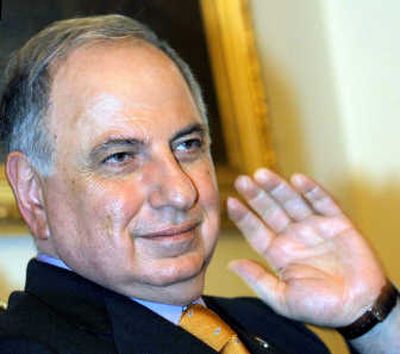Chalabi to push restoration of Baghdad public services

BAGHDAD – Ahmad Chalabi, the controversial, ubiquitous Iraqi politician and one-time Bush administration favorite, has re-emerged as a central figure in the latest U.S. strategy for Iraq.
His latest job: to press Iraq’s central government to use early security gains from the surge to deliver better electricity, health, education and local security services to Baghdad neighborhoods. That’s the next phase of the surge plan. Until now, the U.S. military, various militias, insurgents and some U.S.-backed groups have provided those services without great success.
That the U.S. and Iraqi officials are again turning to Chalabi, this time to restore Baghdad neighborhoods, speaks to his resiliency in this nascent government. It’s also, some say, his latest effort to promote himself as a true national advocate for everyday Iraqis.
Chalabi, in the run-up to the U.S.-led invasion of Iraq in March 2003, provided White House and Pentagon officials and journalists with a stream of bogus or exaggerated intelligence about Iraq’s weapons programs and ties to terrorism. He also suggested that he’d lead Iraq to make peace with Israel and welcome permanent U.S. military bases, which could apply pressure to Iran and Syria.
But Chalabi’s proven a resilient politician since then and Iraqis yearn for someone who can make the government help them. In sermons in the holy Shiite city of Najaf and in Sunni newspapers alike, Iraqis here often reject their central government, saying it has done nothing for them since the fall of Saddam Hussein’s regime. Instead, the government’s critics say, local tribal leaders and residents rejuvenated neighborhoods by pushing fighters out and securing the streets.
U.S. officials maintain that it’s up to the central government to provide Iraqis with longer-term stability. Iraqis agree, especially when it comes to services beyond the capability of neighborhood councils, such as providing electricity, bringing doctors back into neighborhoods, establishing and paying a police force and building a school system. Traditionally, Iraq’s central government delivered these services.
“The key is going to be getting the concerned local citizens – and all the citizens – feeling that this government is reconnected with them,” Gen. David Petraeus, the top military commander here, said Saturday. Chalabi “agrees with that.”
Earlier this month, Prime Minister Nouri al-Maliki named Chalabi as head of the services committee, a consortium of eight service ministries and two Baghdad municipal posts, that is tasked with bringing services to Baghdad, the heart of the surge plan.
Chalabi “is an important part of the process,” said Col. Steven Boylan, Petraeus’ spokesman. “He has a lot of energy.”